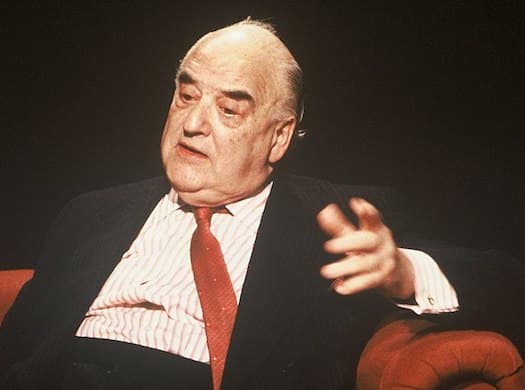Publisher George Weidenfeld: A Maverick Who Became a Lord
The ebullient Weidenfeld, who seems to have hosted several parties a week for most of his 96 years, promoted free speech for everyone, publishing controversial works such as ‘Lolita’ and ‘The Group.’

‘The Maverick: George Weidenfeld and the Golden Age of Publishing’
By Thomas Harding
Pegasus Books, 336 pages
In 1938, George Weidenfeld, an Austrian-Jewish refugee, landed at London. Speaking several languages and conversant in the literature of Europe, he had a gift for friendship that soon enthralled Nigel Nicolson, who persuaded his parents, Sir Harold Nicolson and Vita Sackville-West, to bankroll Weidenfeld and Nicolson, which became known as a publisher of controversial works such as “Lolita” and “The Group.”
The ebullient Weidenfeld, who seems to have hosted several parties a week for most of his 96 years, promoted free speech for everyone, including the Nazis he published after World War II — much to the shock of fellow publishers, the press, and the public.
Weidenfeld had trouble finding printers for “Lolita.” They feared prosecution under the U.K.’s obscenity laws. The publisher persevered and prevailed both in the courts and in public opinion, though critics of the “immoral” Nabokov persisted.
In 1963, an undaunted Weidenfeld published Mary McCarthy’s “The Group,” with “steamy passages,” including one about sexual intercourse in a hotel room, which Mr. Harding quotes. Weidenfeld also cultivated political figures like Harold Wilson as well as publishing Henry Kissinger’s first book, which several other firms had turned down. The publisher offered $2 million for Mick Jagger’s autobiography but the Rolling Stones frontman never produced the book, even after the intervention of two ghost writers. The Jagger fiasco left Weidenfeld unabashed.
There was always another party and another author who just might produce a great book, a best seller, or both. The indefatigable publisher never drank, indulging only in cigars and women, marrying three of the latter. Marriages never seemed to work out because he was always working and out the door.
Like many publishers, though, Weidenfeld had his limits and didn’t mind compromising his principles when doing the right thing was bad for business or violated certain loyalties. Journalist Max Hastings discovered as much when the Netanyahus were outraged by his biography of Yonatan Netanyahu (Yoni), Benjamin’s brother, regarded by the family as a wonderful scholar and hero, who died in the famous 1976 Entebbe Raid that rescued 102 hostages held by Palestinian hijackers in Uganda.
Mr. Hastings had to eliminate passages about Yoni’s unpopularity with the men he led and his less than stellar intellectual accomplishments. Given Weidenfeld’s devotion to Israel, and to the business he was about to do with prominent Israelis, the publisher acted with the same stalwart purpose in suppressing material as he had in liberating the work of others.
Mr. Harding has written one of those “warts and all” biographies, so we get testimony not only from the women who adored Weidenfeld but also from those who despised him. Mr. Harding wonders if they are judging him unfairly by today’s standards. Maybe, but I suppose those disaffected women would say a jerk is a jerk no matter what time of day or era you want to put him in.
Weidenfeld became Lord Weidenfeld and spoke in the House of Lords. He put up with a fair amount of sniggering British antisemitism, but that hardly fazed a man who could publish Nazis in order to understand their mindsets.
The magnificent thing about Weidenfeld is how he went his own way most of the time and brought along with him outstanding people like Isaiah Berlin and historian Hugh Trevor-Roper, even if in the case of the latter, Weidenfeld asked that the criticism of himself be expunged from a published collection of Trevor-Roper’s letters to Bernard Berenson.
If asked about the removal of those unflattering passages about him, I imagine Weidenfeld would have shrugged and said something like, “Nobody’s perfect,” and it wouldn’t be clear if he meant Trevor-Roper or himself.
Mr. Rollyson has published unauthorized biographies of Lillian Hellman, Martha Gellhorn, Norman Mailer, and of Susan Sontag with co-author Lisa Paddock.

